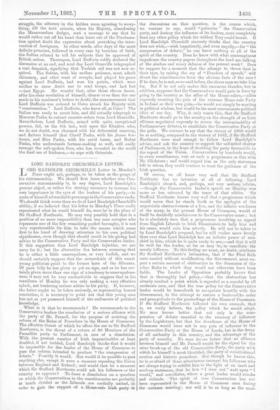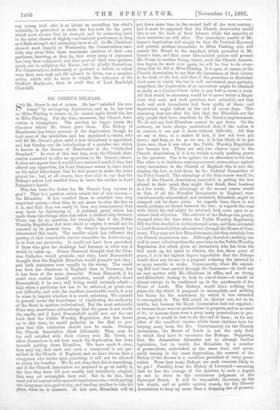LORD RANDOLPH CHURCHILL'S LETTER.
ORD RANDOLPH CHURCHILL'S Letter in Monday's
/ Times ought not, perhaps, to be taken as the gauge of his statesmanship. We should first learn whether true Con- servative statesmanship is, in any degree, Lord Randolph's present object, or rather the strategy necessary to increase his own importance in the eyes of the leaders of his party,—to make of himself a formidable personage in the Conservative ranks. We should think worse than we do of Lord Randolph Churchill's ability, if we believed that his letter to Monday's Times really represented what he would himself do, were he in the place of Sir Stafford Northcote. He may very possibly hold that in a position of no more responsibility than any man occupies who represents one of the few remaining pocket boroughs, it is not very reprehensible for him to take the means which come first to his hand of drawing attention to his own political significance, even though that should result in his giving bad advice to the Conservative Party and the Conservative leader. If this suggestion does Lord Randolph injustice, we arc sorry for it ; but the alternative lies between assuming that he is either a little unscrupulous, or very foolish, and we should certainly suppose that the antecedents of this smart young politician point to the former horn of the dilemma. Of pure folly he has given as yet no sign, and as he has cer- tainly given more than one sign of a tendency to unscrupulous- ness, it may not be very uncharitable to suppose that in his manifesto of Monday he was only making a very effective splash, not tendering serious advice to his party. If, however, the letter ought to be taken seriously, as representing honest conviction, it is necessary to point out that this young man has not as yet possessed himself of the rudiments of political knowledge.
What is it that he recommends ? He recommends to the Conservative leaders the conclusion of a serious alliance with the party of Mr. Parnell, for the purpose of resisting the reform of the Rules of Procedure in tip House of Commons. The effective threat of which he offers the use to Sir Stafford Northcote, is the threat of a return of 80 Members of the Parnellite party to Parliament, in ease of a dissolution. With the present number of Irish impracticables at least doubled, if not trebled, Lord Randolph thinks that it would be impossible for the leader of the House of Commons to pass the reform intended to produce "the compression of debate." Possibly it would. But would it be possible to pass anything else, except it were a measure repealing the Union between England and Ireland ; and would that be a measure which Sir Stafford Northcote could ask his followers or the country to approve ? To force a dissolution on a question on which the Conservatives in the constituencies are probably as much divided as the Liberals are cordially united, in order to gain the support of a Home-rule Irish party in
the discussions on that question, is the course which, we venture to say, would "pulverise " the Conservative party, and destroy the influence of its leaders, more completely than any other policy which the wildest Tory could invent. If Lord Randolph Churchill sincerely thinks that the country does not wish,—wish impatiently, and even angrily,—for "the compression of debate," he can know nothing at all of the spirit of the country. Does he know with what contemptuous impatience the country papers throughout the land are talking of the aimless and weary debates of the present week ? Does he suppose for a moment that the attempt to throw dust in their eyes, by raising the cry of "Freedom of speech," will divert the constituencies from the obvious facts of the case If he does, he is not, as we said before, the clever man we take him for. But if he not only makes this enormous blunder, but in addition, supposes that the Conservatives would gain in force by going to the country as the allies of the Home-rulers,—allies expressly counting the gain of the extreme Homo-rule Party in Ireland as their own gain,—he would not simply be wanting in political wisdom, but would be the most consummate political idiot of our day. Why, it only wants this, that Sir Stafford Northcote should go to the country on the strength of an Irish alliance negotiated expressly to secure the interminability of Parliamentary debates, to annihilate the Conservative Party at the polls. We venture to say that the victory of 1880 would be as nothing, compared to the victory of 1882, if Sir Stafford Northcote were mad enough to follow Lord Randolph's advice, and ask the country to support the unlimited chatter of Parliament, in the hope of doubling the party favourable to the repeal of the Union. Conservatives by hundreds would, in every constituency, vote on such a programme as this with Mr. Gladstone; and would regard him as the only statesman left to whom they could venture to trust the guidance of the Irish question.
Of course, we all know very well that Sir Stafford Northcote has no intention at all of following Lord Randolph's absurd, and, perhaps, not very serious, advice, —though the Conservative leader's speech on Monday was
more or less coloured by the tenor of that advice. Sir Stafford Northcote knows very well that a programme which would mean that he stands forth as the apologist of the unpatriotic obstructiveness of a few, and the infinite wordiness of the many, in the present House of Commons, would of itself be decidedly mischievous to the Conservative cause ; but he is absolutely sure that a programme involving an appeal from English Liberals to Irish Disunionista to help him and his cause, would ruin him utterly. He will not be taken in by Lord Randolph's proposal, but he will realise more keenly than over that Lord Randolph has an infinite power of mis- chief in him, which he is quite ready to use,—and that it will be well for the leader, so far as may be, to conciliate the unruly follower. To this feeling we must, no doubt, attribute Sir Stafford Northcote's intimation, that if the First Rule were carried without modification, the Government must ex- pect a certain amount of obstruction in the discussion of the other Rules to which they would not otherwise have been liable. The Leader of Opposition probably knows that that is thoroughly bad policy,—that the obstruction has already reached a point which is regarded as a scandal by all moderate men, and that the true policy for the Conservative leader would be henceforth to co-operate heartily with the Government., in the attempt to restore a businesslike order and promptitude to the proceedings of tha House of Commons. If Sir Stafford Northcote followed his own counsels, that is, we verily believe, the policy which he would adopt. No man knows better that not only is the com- pression of debate essential to the recovery of influence by the Legislature, but that the decadence of the House of Commons .would issue not in any gain of influence to the Conservative Party or the House of Lords, but in the decay of all authority in this country, and the advantage of the party of anarchy. No man knows better that an alliance between himself and Mr. Parnell would be the signal for the utter break-up of the old Conservative Party, the party with which he himself is most identified, the party of constitutional caution and historic precedent. But though he knows this, he is so afraid of those adventurers amongst his followers who are always trying to exhibit him in the light of an inert and used-up statesman, that he lets "I dare not" wait upon " I would,' and conciliates, where a great leader would rebnke and ridicule. The spirit of true Conservatism has not been represented in the House of Commons once during the autumn meeting ; nor will it be so long as the mad-
cap young lord who is so intent on unsettling his chief's authority, is permitted to strike the key-note for the party which must always find its strength and its animating force in the sober classes of slightly conventional good-sense, so long as it finds strength and animating force at all. As Mr. Gladstone showed most happily on Wednesday, the Conservatives care- fully stay away from these wearisome orations of their own partisans, knowing, as they do, that every scrap of argument has long been exhausted, and that most of their own speakers speak, not to enlighten the House, but to glorify themselves. For Conservatives deliberately to protract a debate, to which even their own rank and file refused to listen, was a senseless policy, which will do more to cripple the influence of Sir Stafford Northcote, than to exalt that of Lord Randolph Churchill.







































 Previous page
Previous page